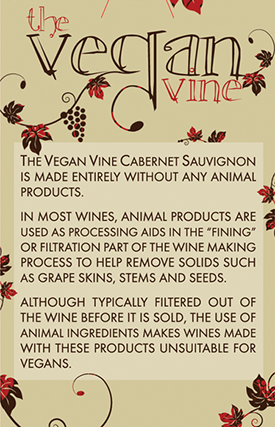Winery Targets Vegan Drinkers
New Clos LaChance line calls attention to California wine made sans animal products

“We didn’t want to just create a second, cheaper label to move juice, but to target new markets,” said Durzy, a business-marketing graduate of the University of San Diego. She was also interested in utilizing the new promotion channels that have arisen from the Internet. “The younger generation wants companies to speak to them almost on a one-to-one basis.”
Her first such effort was “Mommy Juice,” wines spawned by her own experience as the mother of two young children. The $9.95 red and white wines were tested successfully in Northern California Target stores and are now being rolled out across the state.
The vegan wine line developed after the winery’s vice president of sales inquired about vegan wines for her daughter, who doesn’t consume animal products.
Common wine fining agents include gelatin, isinglass, egg whites, casein and dried blood powder. Of course, none (or only minute quantities) remain in the finished wines, but vegans won’t knowingly consume anything that uses animal products.
A website, veganconnection.com, lists vegan wines, but Durzy said she doesn’t know of any other wineries actively pursuing this market.
It turned out that like many wineries, Clos La Chance made some wines that were fined with animal products, although most weren’t. The company decided to market vegan wines, and discovered that the name The Vegan Vine wasn’t taken.
Ironically, the TTB wouldn’t let them claim that the wines don’t use animal products on the label, even though Clos LaChance was required to prove that the wines are vegan before the bureau approved the name.
The brand name tells the story in a flash, however, and the winery uses neckers, point-of-sale displays and marketing literature to further explain the distinction.
Vegan Vine wines include Cabernet Sauvignon, Sauvignon Blanc and a red blend. The first two are identical to other Clos LaChance wines, although the red blend is specially formulated. The pricing is about the same as regular Clos LaChance wines, which average $25 per bottle.
The Cab has already been bottled and the winery is just awaiting labels. Durzy sees stores like Whole Foods as ideal placements, and vegan and vegetarian restaurants. She told Wines & Vines that four distributors have expressed interest in the wine.
The company will also sell the wine direct, of course, using social media and other techniques. The sales manager’s vegan daughter will serve as spokesperson for the wine. “We’re striving for authenticity,” Durzy said.
It’s possible that the introduction of The Vegan Vine will focus more attention on the use of animal products in winemaking in general—which might not please all wineries—but the jump to selling vegan wines isn’t a big step for Clos LaChance, which has pursued sustainability all along, and has even built one marketing campaign around hummingbirds.
Bloggers support Mommy Juice
The other targeted wine, Mommy Juice, is further along in the market. Durzy said Target sold 600 cases during a 90-day trial in 44 Northern California stores. Mommy Juice has 5,500 Facebook followers and has engendered a community of mothers who exchange information and support. “There are a tremendous number of ‘mommy bloggers,’” Durzy commented.
Mommy Juice is available only in a red and a white, both listed at $9.95 per bottle. The red is a Bordeaux blend, while the white is unoaked Chardonnay.
Gary Vaynerchuk of WineLibraryTV has favorably reviewed the wines, although Clos LaChance hasn’t sent samples to the wine media.
Durzy reported that signing up distributors was challenging, despite her large volunteer sales force of fans. “Most distributors are older men, and they don’t get it,” she lamented. The wine is currently available in California, North Carolina and Alberta, Canada.
Clos LaChance does ship direct, although not to Massachusetts, where the wine enjoys huge demand, according to Durzy.
Clos LaChance Winery was founded by Durzy’s parents, former Hewlett-Packard marketing whiz Bill Murphy and his wife Brenda (LaChance) Murphy. They started by planting and tending “landscaping” grapevines for high tech executives, then moved on to winemaking, eventually constructing a winery and planting vineyards in San Martin in the southern Santa Clara Valley hills.
The winery and its vineyards are showcases for the use of technology in winemaking. Bill Murphy is chairman of the board of visitors and fellows at the University of California, Davis, Department of Viticulture & Enology.
SHARE »
CURRENT NEWS INDEX »